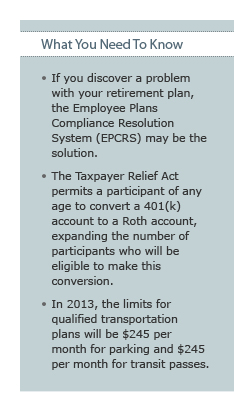Labor and Employment Alert: Correcting Retirement Plan Defects and Other Employee Benefits News

In Revenue Procedure 2013-12, the IRS recently updated the Employee Plans Compliance Resolution System (EPCRS). The EPCRS program permits a retirement plan sponsor to correct operational, coverage and plan documentation errors in certain prescribed ways so as to preserve the tax-qualified status of the retirement plan. If the plan errors are corrected in accordance with the EPCRS, the IRS will not impose financial sanctions on the plan or the plan sponsor.
The EPCRS has three types of correction programs:
- Self Correction Program ("SCP"). SCP permits a plan sponsor to self-correct certain minor or quickly corrected operational errors without making an application to the IRS or paying a fee.
- Voluntary Correction Program ("VCP"). VCP allows a plan sponsor at any time before audit to pay a fee and receive the IRS’s approval for the correction of a retirement plan error.
- Audit Closing Agreement Program ("Audit CAP"). Audit CAP allows a sponsor to correct errors identified by the IRS upon an audit, and to pay a financial sanction based on the nature, extent and severity of the failure that was corrected.
Changes made to the EPCRS program include:
- Expanding the program to include corrections of 403(b) plans;
- Reducing the VCP filing fee for the failure of a sponsor to timely adopt a 403(b) plan by 50%, but only if the VCP application is made to the IRS by December 31, 2013;
- Adding correction methods for the improper exclusion of employees for a safe harbor plan;
- Permit matching contributions owed to a participant to be made in the form of a corrective employer matching contribution so that the contribution will be subject to the plan’s vesting schedule;
- Requiring a plan sponsor to make corrective contributions to an underfunded defined benefit plan when correcting a failure to satisfy any of the long list of funding-based restrictions set forth in Section 436 of the Internal Revenue Code;
- Setting fees for correction of the failure to timely amend a plan for changes in law, when the error is discovered by the IRS during its review of the plan’s determination letter application. The fee, which depends on the number of participants and which law is missed, may be significantly higher than the VCP fee that would apply if a VCP application was filed with the determination letter application, but is lower than typical Audit CAP penalties;
- Creating new Voluntary Correction Program application forms; and
- Because the IRS letter forwarding program was closed during 2012, listing other methods to locate lost participants including the Social Security letter forwarding program, internet search tools, credit reporting agencies and commercial locator services.
If you discover a problem with your retirement plan, the EPCRS may be the solution. Please contact us to explore your options.
Other Employee Benefits News
Roth Plan Conversions
The American Taxpayer Relief Act of 2012 (the "Taxpayer Relief Act"), which was enacted to avoid the "fiscal cliff," provides plan participants with additional opportunities for converting 403(b), 401(k), and certain 457(b) plan accounts into a Roth account. Under prior law, all or part of an individual's account in a retirement plan was eligible to be converted into a Roth account provided that:
- The plan permits participants to make Roth contributions;
- The plan includes provisions allowing for the conversion; and
- The amount converted was eligible for a distribution from the plan.
The last restriction generally meant that only participants who had already attained age 59 ½ or terminated employment were eligible to convert their pre-tax accounts to a Roth account. A participant who elects a Roth conversion is required to pay federal income tax on the amount converted for the year in which the conversion took place. Any subsequent distribution of the converted amount, plus earnings, generally would not be subject to income tax.
The Taxpayer Relief Act permits a participant to convert his or her pre-tax account to a Roth account whether or not it is currently distributable, thus greatly expanding the number of participants who could be eligible to make this conversion.
Roth conversions are typically attractive to participants who expect their tax rate to be higher in the future, either because they expect future promotions to raise their income into higher brackets, or because they expect tax rates to rise.
Your employees can only take advantage of the expanded Roth conversions if you amend your plan. Please let us know if you want your retirement plan amended to take advantage of this new opportunity.
Fringe Benefits
The Taxpayer Relief Act also had an impact on fringe benefits.
Increased limit temporarily extended:
- Qualified Transportation Plans. A qualified transportation plan allows employees to make pre-tax contributions for parking and transit passes. In 2011, an employee could pay, on a pre-tax basis, up to $230 per month for parking and $230 per month for transit passes. Initially, the transit pass limit had not been extended, so for 2012, an employee could pay up to $240 for parking but only $125 for transit passes. The Taxpayer Relief Act restored parity for parking and transit passes through 2013. The limit on each will be $245 in 2013. Surprisingly, the restoration of parity was retroactive to 2012.
Some Temporary Rules Made Permanent:
Although tax laws can always be changed (so describing anything as "permanent" may be a misnomer), inertia now works in favor of the following benefits which no longer have expiration dates.
- Dependent care FSAs. The Taxpayer Relief Act made permanent the amount of "deemed income" of a disabled spouse for purposes of determining how much an employee may contribute to a dependent care FSA.
- Qualified educational assistance and adoption assistance. The exclusions that allowed an employer to provide these benefits to an employee on a nontaxable basis were set to expire December 31, 2012, but now have been made permanent.



